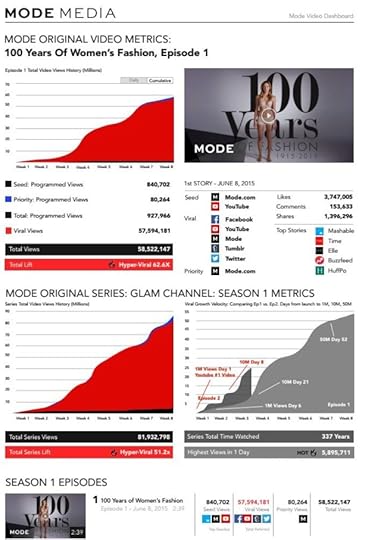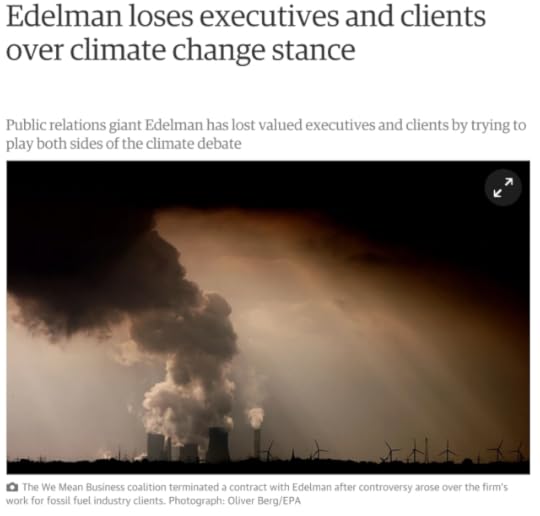Jeff Jarvis's Blog, page 19
August 16, 2015
Hacking through Amazon’s jungle of coverage
The New York Times exposé of working conditions at Amazon lacks two key attributes: context and — I can’t quite believe I’m saying this — balance.
Like everyone in my feeds, I read the story with something verging on horror. Since then, I’ve seen many tweets presenting another perspective and just read a point-by-point rebuttal by an Amazonian.
Where’s the truth? in the mix. Except as a reader, I had to go search for that mix.
First, context: Last night on Twitter, I half-joked that Amazon sounded like many newspaper newsrooms:
Amazon: long hours, backbiting, politics, devotion, competition, devotion to sales. Yup, sounds like newspapers–when they were successful.
— Jeff Jarvis (@jeffjarvis) August 16, 2015
Jay Rosen later responded:
@jeffjarvis But not the no-decisions-without-data or customer-service principles. Those were not characteristic of newspapers.
— Jay Rosen (@jayrosen_nyu) August 16, 2015
You get the point: Where is the context about work as a whole? Is every office as wonderful as Google and Facebook are supposed to be? No, of course not. We all know that. So to what standard is Amazon being held? Is it better or worse than comparable and realistic (read: unGoogle) workplaces? That’s not in the piece. It needs to be.
Now to balance. Nick Ciubotariu, an engineer and executive at Amazon, wrote a very long rebuttal on LinkedIn, which I found only thanks to a Dan Gillmor link. Amid some amusing techcospeak (an issue “gets actioned”) are clear and sincere explanations for much of what The Times thinks it has exposed. For example, the orientation at any company, taken out of context, might sound like brainwashing; that’s normal. He says that the cases of how employees with pregnancies and health and family issues were allegedly mistreated are appalling and the company must address them. He acknowledges that Amazon might have changed between its founding and his hiring 18 months ago. But he likes working there. He, like many colleagues, is attracted to tackling huge problems — and that is obviously not easy work.
The Times talked with some Amazon employees but makes a point of saying that they were offered up by the company and so they are presumed to be like North Korean media handlers; they are to be discounted. Most of what The Times garnered from unofficial sources was negative. Most of what Ciubotariu says is positive.
We, the readers, are left to balance these accounts ourselves. And that’s my problem. The Times should have presented enough of that conflicting evidence so that we could weigh evidence and decide for ourselves whether Amazon is hell in Seattle.
But The Times decided that for us. It wanted to expose Amazon’s working conditions. It devoted two reporters for six months to do just that (who would devote such resource to finding out that it’s an OK place to work, if you have to work?).
The Times had an agenda. Well, some of you might remind me: Haven’t you, Jarvis, argued that journalism is by definition advocacy? Yes, and it’s clear The Times wanted to tackle the issues that arise from such demanding work. But as a journalistic institution, The Times is still required to exhibit the intellectual honesty to credibly and fairly present evidence that counters its worldview. It is still required to give us in the public the respect and trust to make our own decisions about what it presents.
But that’s not what The Times did. I am not doubting the truth of what The Times presented, only the selection. I am also not saying that after balancing all this, I would want to work at Amazon. I can’t stand the idea of a culture that enables an anonymous feedback system, which The Times exposes and its employee defends; I sure as hell won’t want to see that trend spread to other workplaces. I worry about a culture that can allow the cases of cold-hearted lack of empathy for employees’ lives that The Times presents, even if they are just anecdotal. On the other hand, I admire greatly the commercial and logistical miracle that Amazon has built. I love the idea of working side-by-side with people as smart, accomplished, dedicated, and passionate as the people who have built Amazon. I also read the piece worried that all this publicity would lead — Gawkerlike — to unionization, and I think that could jeopardize its growth.
On that last point, you may think I sound like an owner. I am. I have long held a few shares in Amazon. So you should judge what I say here with that conflict of interest well in mind. You’re probably scolding me right now for not saying it at the top of this piece. You’d be right. And that is how I illustrate my last point: The Times did not say until halfway down its very long piece that Amazon founder Jeff Bezos owns the Washington Post, which some say is closing in on The Times.
The problem at a moment like this is that once one starts to believe The Times might have an agenda, one is left trying to suss out what it might be: against Amazon and its owner, Bezos, who is a competitor; against technology, a direction too much of media is taking (you should see the latest from Der Spiegel; its technopanic should be printed in purple ink); in favor of big labor? I wouldn’t be wondering that if The Times had given me greater context and balance and sufficient information to let me decide about Amazon for myself rather than having it decided for me. And that’s too bad. There is much good reporting here. There are important issues and modern-day phenomenon that deserve discussion. Instead, we’re starting to discuss The Times.
LATER: I think I’m clear about this but let me be extra clear: I am not saying The Times has a competitive agenda against the Post and thus Bezos. I am saying that it will open itself up to such questioning by not being sufficiently transparent and not exhibiting intellectual honesty by providing sufficient balance to make clear that in the end the judgment is the reader’s.

August 10, 2015
What Would Alphabet Do?

You’d expect me to say this but Google’s transformation into Alphabet is a brilliant move that enables Page, Brin, and their company to escape the bonds of their past — They’re just a search company. Why are they working on self-driving cars and magical contact lenses and high-flying balloons? — and go where no one has thought they would go before.
To Wall Street and countless bleating analysts — not to mention its competitors and plenty of government regulators — Google was a search company, though long ago it became so much more. I don’t just mean that it also made a great browser, the best maps, killer email, an open phone operating system and some of the best phones, and a new operating system (and the damned fine computer I’m writing on right now) — and that it acquired the biggest video company and the best traffic data company. I don’t just mean that Google has for a long time really been the powerhouse advertising company.
No, Google long ago became a personal services company, the post-mass-market company that treats every user as a customer it knows individually. That is the heart of Google. When they say they “focus on the user and all else will follow,” they mean it.
But Google was also a technology company, working on projects that didn’t fit with that mission.
So this move lets Page and Brin move up to the strategic stratosphere where they are most comfortable. It lets them recognize the tremendous job Sundar Pichai has been doing running the company that is now “just” Google. It lets them invest in new experiments and new lines of business — cars, medical technology, automated homes, and energy so far, and then WTF they can imagine and whatever problems they yearn to solve. It lets them tell Wall Street not to freak at a blip in the ad market — though, of course, the vast majority of the parent company’s revenue will still come from Google’s advertising business.
A journalist asked me a few minutes ago whether there was any risk to the change. I couldn’t think of any then. I suppose one risk is that this will only freak out especially European media and regulatory technopanickers, who will now go on a rampage warning that — SEE! — Google does want to rule the world. But what the hell. They were going to do that anyway.
A few weeks ago at Google I/O, I had the privilege of meeting Page. To introduce myself, I said that I wrote a book called What Would Google Do?. “Oh, I remember,” he said with impish grin and then he asked: “What would Google do? I want to know.”
See, I don’t think even Larry Page knows what Google — er, Alphabet — will do. He is now setting himself up for discoveries, surprises, exploration, experimentation, and a magnificently uncertain future. Who wants a certain future? That’d be so damned boring. So horribly conventional.
Disclosure: I own Google — er, Alphabet — stock. And I now lust after Alphabet swag.

August 6, 2015
New video powerhouse

The amazing Samir Arora, CEO of Mode (née Glam), called with some impressive numbers on his company’s new platform and aggressive push into video.
A two-minute video illustrating 100 years of fashion gained 1 million views in six days, 10 million in 21, and now — a bit more than eight weeks out — has 58 million views. Almost three-quarters of those views came on Mode’s own network — where they can prioritize users based on relevance and influence; the rest on Facebook, YouTube, et al.
In two months, Mode is now the 13th video property according to ComScore; it was already the 7th web property.
Through this, Mode is building two big video revenues streams: half from prerolls (YouTube’s territory), the other half from distributing brands’ video content and from sponsorship of its own video content. Video, of course, has enviable CPMs running $20-$45 for this kind of content.
Note well that with Mode, creators always get paid for their content — whether as revenue share or for hire. Importantly, under certain circumstances, distributors also get paid.
Glam started as a network; that is what brought Samir and me together. It then set about building tools for content creation, curation, and distribution. Samir’s big lesson, he said, is that an ecosystem needs a platform.
Mode still is under the radar for many in media. I’d reset your radar.
Here’s VentureBeat on the these numbers; and Scoble, too.

August 5, 2015
Journalism is not a crime: A letter to German authorities
A large group of key figures in journalism and technology in Germany and elsewhere has published an open letter to German authorities in a critical fight for press freedom there. The letter is below. I am among the signatories. The editors at Netzpolitik and their sources were being investigated for treason for sharing government documents openly. A furor ensued in German media and online. The case was supposedly called off. Then the German justice minister called for the resignation of the chief prosecutor who had started the investigation. Rather than going quietly, that prosecutor is accusing the justice minister of interfering in a case; this is now being called a constitutional crisis. This case and the danger are not over.
Jacob Appelbaum put out a call on Twitter for those who would want to join in a letter to German authorities. I did; so did many I respect. Here it is:
“The investigation against Netzpolitik.org for treason and their unknown
sources is an attack against the free press. Charges of treason against
journalists performing their essential work is a violation of the fifth
article of the German constitution. We demand an end to the
investigation into Netzpolitik.org and their unknown sources.”
“Die Ermittlungen gegen die Redaktion Netzpolitik.org und ihrer
unbekannten Quellen wegen Landesverrats sind ein Angriff auf die
Pressefreiheit. Klagen wegen Landesverrats gegen Journalisten, die
lediglich ihrer für die Demokratie unverzichtbaren Arbeit nachgehen,
stellen eine Verletzung von Artikel 5 Grundgesetz dar. Wir fordern die
sofortige Einstellung der Ermittlungen gegen die Redakteure von
Netzpolitik.org und ihrer Quellen.”
“Les charges contre Netzpolitik.org et leur source inconnue pour
trahison sont une attaque contre la liberté de la presse. La poursuite
pour trahison des journalistes qui effectuent un travail essentiel pour
la démocratie est une violation du cinquième article de la constitution
allemande. Nous demandons l’arrêt des poursites contre les journalistes
de Netzpolitik.org et leurs sources.”
“La investigación en contra de Netzpolitik.org y su fuente por traición
es un ataque a la libertad de la prensa. Acusaciones de traición a la
patria hechas contra periodistas quienes estan realizando su labor
esencial es una violacion del quinto artículo de la Constitución
alemana. Exigimos que se detenga la investigación en contra de
Netzpolitik.org y su fuente desconocida.”
Mahsa Alimardani, University of Amsterdam/Global Voices
Pierre Alonso, journalist, Libération
Sebastian Anthony, editor, Ars Technica UK
Jacob Appelbaum, independent investigative journalist
Jürgen Asbeck, KOMPASS
Julian Assange, editor-in-chief, WikiLeaks
Jennifer Baker, founder, Revolution News
Jennifer Baker (Brusselsgeek), EU correspondent, The Register
Diani Barreto, Courage Foundation
Mari Bastashevski, investigative researcher, journalist, artist
Carlos Enrique Bayo, editor-in-chief, PÚBLICO, Madrid, Spain
Sven Becker, journalist
Jürgen Berger, independent journalist
Patrick Beuth, journalist, Zeit Online
Ellery Roberts Biddle on behalf of Global Voices Advox
Florian Blaschke, blogger and managing editor, t3n.de
Eva Blum-Dumontet, Privacy International
Anne Bohlmann, freelance journalist
Detlef Borchers, freelance journalist, Heise
Stefan Buchen, journalist, NDR
Silke Burmester, journalist
Jan Böhmermann, late night TV host
Wolfgang Büchner, managing director Blick-Group, Switzerland / former
editor of DER SPIEGEL, Germany
Shawn Carrié, News & Politics editor, medium
David Carzon, deputy editor, Libération
Marina Catucci, journalist, Il Manifesto
Robin Celikates, associate professor of philosophy, University of Amsterdam
Graham Cluley, computer security and privacy columnist, grahamcluley.com
Gabriella Coleman, Wolfe Chair in Scientific and Technological Literacy,
McGill University
Josef Ohlsson Collentine, journalist, Pirate Times
Tommy Collison, opinion editor, Washington Square News
Ron Deibert, director, The Citizen Lab, Munk School of Global Affairs,
University of Toronto
Valie Djordjevic, publisher and editor of iRights.info
Daniel Drepper, senior reporter, CORRECT!V
Joshua Eaton, independent journalist
Matthias Eberl, multimedia journalist, Rufposten
Helke Ellersiek, NRW-Korrespondentin, taz.die tageszeitung
Carolin Emcke, journalist
Monika Ermert, freelance journalist
Anriette Esterhuysen, executive director, Association for Progressive
Communications
Cyrus Farivar, senior business editor, Ars Technica
Lorenzo Franceschi-Bicchierai, journalist, Motherboard, VICE Media
Carola Frediani, journalist, Italy
Erin Gallagher, Revolution News
Johannes Gernert, journalist, TAZ
Aaron Gibson, freelance journalist and researcher
Dan Gillmor, author and teacher
John Goetz, investigative journalist, NDR/Süddeutsche Zeitung
Gabriel González Zorrilla, Deutsche Welle
Yael Grauer, freelance journalist
Glenn Greenwald, investigative journalist, The Intercept
Markus Grill, chief editor, CORRECT!V
Christian Grothoff, freelance journalist, The Intercept
Claudio Guarnieri, independent investigative journalist
Amaelle Guiton, journalist, Libération
Marie Gutbub, independent journalist
Nicky Hager, investigative journalist, New Zealand
Jessica Hannan, freelancer
Sarah Harrison, investigations editor, WikiLeaks
Martin Holland, editor heise online/c’t
Max Hoppenstedt, editor in chief, Vice Motherboard, Germany
Bethany Horne, journalist, Newsweek Magazine
Ulrich Hottelet, freelance journalist
Jérôme Hourdeaux, journalist, Mediapart
Johan Hufnagel, chief editor, Libération
Dr. Christian Humborg, CEO, CORRECT!V
Jörg Hunke, journalist
Mustafa İşitmez, columnist , jiyan.org
Eric Jarosinski, editor, Nein.Quarterly
Jeff Jarvis, professor, City University of New York, Graduate School of
Journalism
Cédric Jeanneret, EthACK
Simon Jockers, data journalist, CORRECT!V
Jörn Kabisch, journalist, Redaktion taz. am wochenende
Martin Kaul, journalist, TAZ
Nicolas Kayser-Bril, co-founder of Journalism++
Matt Kennard, Bertha fellow at the Centre for Investigative Journalism,
London
Dmytri Kleiner, Telekommunisten
Peter Kofod, freelance journalist, boardmember Veron.dk, Denmark
Joshua Kopstein, independent journalist, Al Jazeera America /
contributor, Motherboard / VICE
Till Kreutzer, publisher and editor of iRights.info
Jürgen Kuri, stellv. Chefredakteur, heise online/c’t
Damien Leloup, journalist, Le Monde
Aleks Lessmann, Bundespressesprecher, Neue Liberale
Daniel Luecking, online-journalist, Whistleblower-Network
Gavin MacFadyen, director for Center of Investigative Journalism and
professor at Goldsmiths University of London
Rebecca MacKinnon, journalist
Tanja Malle, ORF Radio Ö1
Dani Marinova, researcher, Hertie School of Governance, Berlin
Alexander J. Martin, The Register
Uwe H. Martin, photojournalist, Bombay Flying Club
Kerstin Mattys, freelance journalist
Stefania Maurizi, investigative journalist, l’ESPRESSO, Rome, Italy
Declan McCullagh, co-founder & CEO, Recent Media Inc
Derek Mead, editor, Motherboard (VICE Media)
Johannes Merkert, Heise c’t – Magazin für Computertechnik
Moritz Metz, reporter, Breitband, Deutschlandradio Kultur
Katharina Meyer, Wired Germany
Henrik Moltke, independent investigative journalist
Glyn Moody, journalist
Andy Mueller-Maguhn, freelance journalist
Erich Möchel, investigative journalist, ORF, Austria
Kevin O’Gorman, The Globe and Mail
Frederik Obermaier, investigative Journalist, Germany
Philipp Otto, publisher and editor of iRights.info
David Pachali, publisher and editor of iRights.info
Trevor Paglen, freelance journalist and artist, America
Michael Pereira, interactive editor, The Globe and Mail, Canada
Christian Persson, co-publisher of c’t magazine and Heise online
Angela Phillips, professor Department of Media and Communications,
Goldsmiths University of London
Edwy Plenel, president, Mediapart
Laura Poitras, investigative journalist, The Intercept
J.M. Porup, freelance journalist
Tim Pritlove, metaebene
Jeremias Radke, journalist, Heise, Mac & i
Jan Raehm, freelance journalist
Andreas Rasmussen, danish freelance journalist
Jonas Rest, editor, Berliner Zeitung
Georg Restle, redaktionsleiter, ARD Monitor
Frederik Richter, reporter, CORRECT!V
Jay Rosen, professor of journalism, New York University
Christa Roth, freelance journalist
Leif Ryge, independent investigative journalist
Ahmet A. Sabancı, journalist/writer, co-editor-in-chief and
Co-Spokesperson of Jiyan.org
Jonathan Sachse, reporter, CORRECT!V
Philip Di Salvo, researcher and journalist
Don Sambandaraksa, Southeast Asia Correspondent, TelecomAsia
Eric Scherer, director of future media, France Télévisions
Kai Schlieter, Reportage & Recherche, TAZ
Christian Schlüter, journalist, Berliner Zeitung
Marie Schmidt, journalist, Die Zeit
Bruce Schneier, security technologist and author
David Schraven, publisher, CORRECTIV
Daniel Schulz, Redaktion taz.am wochenende
Christiane Schulzki-Haddouti, independent journalist and researcher
Merlin Schumacher, editor in chief, for Zebrabutter
Clay Shirky, associate professor, NYU
Teresa Sickert, author and radio host
Christian Simon, editor, Social Media Watchblog
Claudia Simon, kultur propaganda, Berlin – www.kultur-propaganda.de
Mario Sixtus, Elektrischer Reporter
Michael Sontheimer, journalist, DER SPIEGEL
Efe Kerem Sozeri, journalist, Jiyan.org
Matthias Spielkamp, iRights.info, board member of Reporters without
Borders Germany, member of the advisory council of the Whistleblower
Netzwerk
Volker Steinhoff, Redaktionsleiter ARD Panorama
Andrea Steinsträter, journalist and editor at the news team of the WDR
Television
Catherine Stupp, freelance journalist
Batur Talu, media consultant, Istanbul
Trevor Timm, co-founder and executive director, Freedom of the Press
Foundation
Dimitri Tokmetzis, journalist, De Correspondent
Ilija Trojanow, journalist
Albrecht Ude, journalist
Martin Untersinger, journalist, Le Monde
Nadja Vancauwenberghe, editor-in-chief, EXBERLINER
Andreas Weck, journalist
Jochen Wegner, editor-in-chief, ZEIT ONLINE
Stefan Wehrmeyer, data journalist, CORRECTIV
Rob Wijnberg, founder, editor-in-cheif, De Correspondent
Jeroen Wollaars, correspondent for Germany and Central Europe, Dutch
public broadcaster NOS
Krystian Woznicki, berlinergazette.de
Maria Xynou, researcher, Tactical Tech
John Young, Cryptome
Juli Zeh, author
Christoph Zeiher, independent journalist

July 15, 2015
Exploding our ideas of membership: A CUNY summit
We are holding an important event at CUNY on August 26 exploring membership strategies for media — beyond pledges and paywalls.
Let’s be honest: In most news organizations, membership is just another word for subscription or for hawking tote bags. At this event, I want to see us push far beyond the present state of the art and challenge ourselves to reimagine what membership can mean for news organizations and their relationships with the people and communities they serve.
We will start with sessions led by two innovators in membership: public-media genius Melody Kramer (who just released a superb report with her latest ideas) and local media’s best friend, Josh Stearns, who is working on membership experiments in the New Jersey news ecosystem. We will learn about best practices in membership from outside the media industry (what could the frequent-flier miles of news be?). And — this is the critical part — we will take all that information and inspiration and then, in the best spirit of the unconference, brainstorm new opportunities for membership for news organizations of various types and sizes.
Here is the sign-up for the event.
I see three frontiers for innovation:
* New tribes: A person might feel an urge to join a club called the Guardian because it takes on causes or NPR or even The New York Times out of patronage. But does anyone really want to belong to — will they feel an affinity and loyalty to and want to brag about their special relationship with — say, Columbus Dispatch? Not so much. But one might well want to belong to the Columbus pissed-off commuters’ club or the Columbus school improvement society or the Columbus environment alliance or the Columbus senior club. My point: communities are internally, not externally defined; they are not built outside-in or top-down under brands. The premise of our social journalism program at CUNY is that we must begin by listening to communities and understanding their needs before we can serve them well. The same goes for membership. The opportunity is to build membership from the bottom up by serving many communities with many affinities, loyalties, and needs that we can answer.
* New currencies for contribution: We can extract value from our relationships with the public we serve in so many forms other than just cash. Indeed, we must learn to value our people — our users, our readers — beyond just their circulation dimes or CPM pennies. We must value them as individuals rather than as members of an anonymous mass. To join a community, we should value and credit the public’s effort, expertise, contributions of content, volunteer marketing (i.e., social media love), commerce (buying things through us or from our advertisers), and showing up (coming to our events). I explored some of these notions in a long-ago post that speculated about a reverse pay meter; Melody explores many more in her report.
* New currencies for reward: When we give our members nothing more than access to our content, then we are merely putting a new label on an old business model: the subscription. We can reward members in so many more ways: with access to events and our journalists, with some voice in the allocation of our resources, with social capital, with discounts from our advertisers….
Out of these ideas and more that we will explore on August 26 will come many new models for membership. The product of the day will not only be potential new business models but also new ways to look at–to quote my friend Jay Rosen–the people formerly known as the audience. When our members are our collaborators, the recipients of our services, experts, and our friends, then the nature of our product — our service — called journalism changes fundamentally. If we have any hope to compete with Google, Facebook et al for the attention and affection of the public we serve — and for the first-party data that will rescue us from advertising commodification — we must reconsider our essential relationship with them. We must become members of the same clubs.
If this is of interest to you and your news organizations, please sign up now.

July 13, 2015
How (not) to interview
Here’s an object lesson for journalism students in the art of the interview.
Poor Sundar Pichai, the No. 2 at Google, sat down for an interview with a New York Times technology reporter, only to find himself bombarded with the same question a half-dozen ways, to wit: Aren’t mobile phones bad for us?
First question: “Do you see mobile phones heading down a path of social unacceptability? Do we have a problem of overuse?”
After acknowledging that phones can do good things — goddamned miracles, I’d say — the reporter came back to his plaint: “But then people start doing things like checking their email at dinner. Are there things Google is doing to return people to where they are and reduce the temptation to look at their phone?” Like everything else, isn’t this your fault, Google?
Sundar tried to politely deflect: “You’re asking questions that have nothing to do with technology. Should kids check phones at dinner? I don’t know. To me that’s a parenting choice.”
The reporter tried again. And then again: “As you have risen in the ranks at Google, have you noticed that people use their phones less in meetings with you?”
And again: “Have you done anything to ease back? I have a policy that I’m not allowed to walk around the house with my phone. It has to stay in one room.”
Oh, jeesh. I imagine the reporter getting Grandma’s telephone table from the front hall and tying an iPhone to it. Some of us would say that eliminating the need for wires was progress.
It’s not hard to see what was happening here: The same reporter had an “analysis” published the same day on devices and programs to get users to crack that addiction the reporter thinks we have to our phones. He interviewed Pichai and decided to make a blog post out of the transcript, giving us a window to the sausage factory. The writer wanted a quote for his story. So he did what reporters often do: He asks the same question over and over … until he gets the quote he wants for his story. That’s how interviews are too often held: to fill in a blank the writer has already made rather than really listening and being open to new information and new angles.
When a reporter does this to me, I finally say: You can ask the same thing as many times as you want but I’m not giving you the answer you want. Corporate executives trying to make nice can’t do that.

The state of hyperlocal
 Tow-Knight just released a new survey of the state of business at hyperlocal sites, conducted by Michele McLellan, creator of the authoritative Michele’s List.
Tow-Knight just released a new survey of the state of business at hyperlocal sites, conducted by Michele McLellan, creator of the authoritative Michele’s List.
The bottom line remains: This is a tough business. A third of them bring in more than $100,000 a year; the rest under. Almost half are profitable and another quarter have a steady flow of income. Most are heavily dependent on advertising. The good news, as far as I’m concerned: Many have hired business and sales help.
This is important work, for as I wrote in Geeks Bearing Gifts, I believe that beat businesses can be a building block of broad new news ecosystems in communities. This is why we now support Michele’s List at Tow-Knight. This is why we just held training for new beat businesses here. This is why I work with the Dodge Foundation in New Jersey on helping to support and build the news ecosystem in my home state. We need more training in business to bring these journalists running beat businesses to sustainability. But as Michele shows, this is also hard work, damned hard work.
Michele suggests possible areas for further research. I will argue to foundations that care about healthy news ecosystems that they should help support their growth by giving seed grants and funding training for new beat businesses. I hope other journalism and business schools will help train these brave entrepreneurs who care about their communities.

July 8, 2015
An object lesson for native content makers

Edelman, the world’s largest PR firm, finds itself between a lump of coal and a hard place by working for old energy companies while it also tries to appeal to corporate responsibility clients.
And therein lies an object lesson for media companies getting into the business of making and publishing native content. For that work — “telling brands’ stories,” as we euphemistically put it — puts the media company into the business of a public relations or advertising agency. It forces us to ask: Whom do we serve? And what does our brand stand for?
In What Would Google Do? — inspired by ad genius Rishad Tobaccowala — I came to argue that public relations firms should take their title seriously and represent the public to the company rather than the company to the public. It necessarily follows that if a brand owner flouts the advice of such a public envoy, then the envoy needs to fire the client or it will lose its trust from the public.
Are public relations (or advertising) companies willing to do that? Judging by the evidence of the story pictured above, no. And that’s not at all surprising. PR companies exist to fall on their own swords for their clients.
But what of news companies? Will they be willing to fire a brand and give up the business of telling its story? Where are the lines? What if Shell Oil comes to your news organization, checkbook in hand, to tell its story, or that fracking company that advertises every Sunday morning wants you to make a video about the wonders they enable? Or a gun maker while you’re exposing deaths by firearms? Or a drug manufacturer when your newsroom is busy exposing how drug makers addict children to opioids? Is it one matter to publish their ads and another to make them?
Just asking.

May 26, 2015
Calling all entrepreneurial–and social–journalism educators
At CUNY on July 16 and 17, we are holding our second annual summit for entrepreneurial journalism educators and combining it with our first annual summit for social journalism educators. Two, two, two mints in one.
We will start the day on Thursday, July 16 focusing on entrepreneurial journalism education, this year focusing on the teaching of design thinking and once again sharing best practices. That afternoon, we will join with social-journalism educators to share problems and solutions. And, because unconferences are de regueur, we’ll reserve time to break into discussions that you want to have. The next morning, we will shift our focus to social journalism education. Because this field is so new, we will focus on defining what social journalism is: definitions, pedagogical goals, and the relationship with mainstream journalism education.
My colleagues at CUNY — Jeremy Caplan from entrepreneurial journalism and Carrie Brown from social journalism — and I will share our experience teaching in both fields.
You should sign up and come if you teach or want to teach in either field. Everyone is welcome to stay for both halves as we figure there will be much overlap.
This was a great event last year at which we shared many best practices and solutions to each others’ problems. It is back by popular demand.

May 17, 2015
Playing leapfrog and werewolf with Google and Facebook

First Google made its friendship pact with eight old, European publishers, vowing to innovate together. Then Facebook leapfrogged Google — by a considerable distance — launching its Instant Articles with nine publishers, old world and new, inviting them into its mobile News Feed and helping them make money to boot. Now it’s Google’s turn to leapfrog Facebook. We like this game.
That opportunity for publishers — to build upon these positive steps — is what I, for one, emphasized this weekend in more than one session at Google’s excellent gathering in Helsinki, Newsgeist Europe, an unconference where we the participants chose what to talk about. Among other topics, we chose to talk about what Google could do for news, about Facebook as the new distributor — and sometimes editor — of the news, and about at least one idea to take advantage of that new reality.
That idea is something Google News chief Richard Gingras and I advocated at the last Newsgeist in the U.S., something I’ve been working on for years: the containerized, embeddable article that travels to any site with brand, revenue, analytics, and links attached. In other words, let’s take what Facebook has done with Instant Articles and open it up to any creator and any embedder. I was delighted to hear serious discussion of the notion at this Newsgeist, opening the door to reimagining the distribution of news so that instead of always requiring and depending on our users to come to us, we can now take our news to them.
Now there are many many issues and questions around this model, and you can count on a circleful of journalists to raise them all: how distributed news affects the business of journalism and how both creators and distributors can share in the value they make; the power and responsibility our new distributors hold over the dissemination of information and whether they will act as protectors of news or as censors or catalysts for cat lists; whether creators will get the specific user data they need to build relationships of relevance and value with the people they serve (that is the key issue, I think).
But if we’re honest with ourselves, we will recognize that the horse — and the article — have left the barn. Facebook was already a primary source of audience — links and clicks — for news. Now it will be a key distributor of complete content. You can bet that others will follow, taking what they already have — Twitter with its cards; Snapchat with Discover; Amazon with the Washington Post on its Kindle; Google and Apple with their newsstands — and finding ways to embed content with business model attached into the streams they deliver. Note also that we could find ourselves in a nightmare of publishing content 20 ways on 20 platforms using 20 CMSes in 20 business deals that we don’t control, struggling to make sense of too little data from each.
Publishers could take the lead and create open-source standards and structure for distributed news. But news publishers have proven to be awful at collaborative consortia (see: NCN) and worse — much worse — at technology. And this is no trivial task, as Repost.US learned when it couldn’t sustain its wonderful rendition of the embeddable article (for reasons I explore in Geeks Bearing Gifts). If we’re going to do this, we need help.
Who will help? I suggested Google, which could build the structure openly, adding its own services — ad sales, ad serving, hosting — as options. In the discussion, some feared that Google’s direct involvement beyond funding the project out of its European bribery — er, I mean innovation — fund would give the service cooties. Gift horse: mouth. Well, then Facebook could open up its lovely platform and CMS and make it possible to embed Instant Articles anywhere.
Note well the position that news publishers are in now. And a fine position it is: Google, Facebook, and potentially other powerhouses are finally competing for our affection to keep the wolves — that is, European regulators — at bay.
It’s metaphorically convenient that the favorite recreational activity at Newsgeists is a game called werewolf, which is all about mistrust. Suspicion has been the basis of the relationship between publishers and platforms. That atmosphere of wariness and warring was brought on by a campaign waged against Google by German publishers Axel Springer and Burda, using their considerable political clout to enlist politicians to pass laws and launch antitrust investigations disadvantaging the American technology giant. Google’s peers — Facebook, Amazon, Apple — are well aware that Old Europe’s pitchforks could be launched at them next. So though I did not like the tactic — because it is leading to dangerous if unintended consequences that could imperil an open net as well as European innovation — I must give credit where credit is due, to Springer and Burda, for bringing Silicon Valley to the table if not to its knees. Credit to Google and Twitter for talking. Credit to the publishers that are working with each, seeking peace in the kingdom. Group hug.
Now the game shifts from werewolf to leapfrog. Now we in journalism get to stand back and see technology titans jump over each other to bring benefits to news. But we’d best not stand back too far. We journalists and publishers must collaborate with the platforms as we demand that they collaborate with us. And as they teach us about technology, we must teach them about journalism.
By that, I mean that as platforms take on the role of distributor and (I lament this word) gatekeeper for news, we must help them understand the responsibility they are assuming. Mark Zuckerberg cares about a connected society. Does he also care about an informed society? I believe he does — witness his proper pride at seeing his platform being used by freedom fighters. Now Facebook must find the courage to publish and protect uncomfortable news, for real news, impactful news is almost always difficult news. It must fight to be open to diverse and often dissenting voices and viewpoints in the face of pressure from censors and tyrants, which will surely grow now that Facebook is carrying more news that matters. And as Facebook benefits from the content — the journalism and service — that publishers provide, then it does bear some responsibility to consider their business needs (and I’m delighted that Facebook did just that, offering publishers revenue with distribution via Instant Articles).
My friends Emily Bell, Jay Rosen, and George Brock have written about these concerns, as have I. I don’t think any of us would expect Facebook to produce all the answers overnight; indeed, we should not want them to make these decisions alone. What we do expect of Facebook, Google, and the other platforms is an open and substantive conversation about these principles. And they should expect from us a spirit of generosity and collaboration. We all now recognize that we live together in an ecosystem of information, technology, and service. We must build and maintain it together.
Unconferences, innovation funds, education, and especially new products like Instant Articles will help do that. But group hugs aren’t enough. We don’t just need to embed articles. We need to embed and educate people on both sides of this cultural divide who can understand and translate the differences and, more important, find opportunities of mutual benefit. These are not merely ambassadors doing biz dev and PR. They don’t just make each side smarter. They must make shit happen. They must build things. That means having technologists in the management of news companies and journalists in the product stream of technology companies.
I can imagine countless ways in which collaborative technologists and journalists can build great services for the public we serve. Traveling articles are just one example, a starting point. There were others raised at Newsgeist.
At this point, I know what many will say in the comments wherever links to these thoughts appear: “Well, I just don’t trust Facebook/Google/etc.” “They will pull the rug out from under us.” “They will never do what we want.” “They will serve their own interests.” Well, of course, they will serve their interests. They are businesses. But it’s no longer accurate to say that they cannot also benefit us or that they will not listen. Who’d have imagined — many at Newsgeist confessed they couldn’t — that Facebook would not only invite publishers into its precious stream but also let them keep 100% of the ads they sell for the privilege. Who’d have imagined that even Springer’s Bild would sign up for the deal? Who could have pictured the warm and substantive interaction of journalists, publishers, and Googlers this weekend in Europe?
The sensible, mature, productive way to enter negotiations is not to stomp away. The smart thing to do is to craft business terms. That’s what I teach my students. What would make you do a deal with the titans now that they are willing to talk? What would protect you against your concerns? What do you have that they want and what do they have that you want? Where is their mutual benefit for your businesses and — here’s the only thing that matters in the end — for the people we all serve?


Jeff Jarvis's Blog
- Jeff Jarvis's profile
- 133 followers




